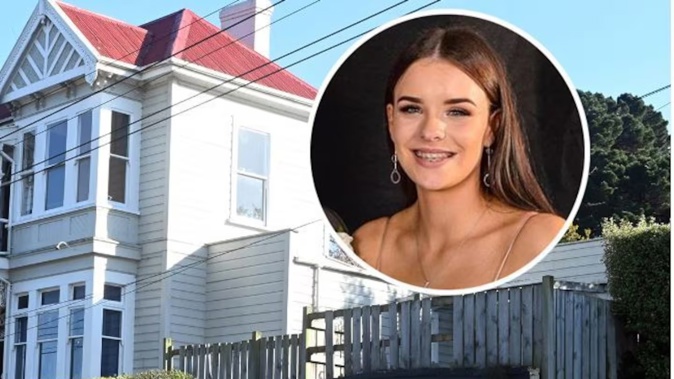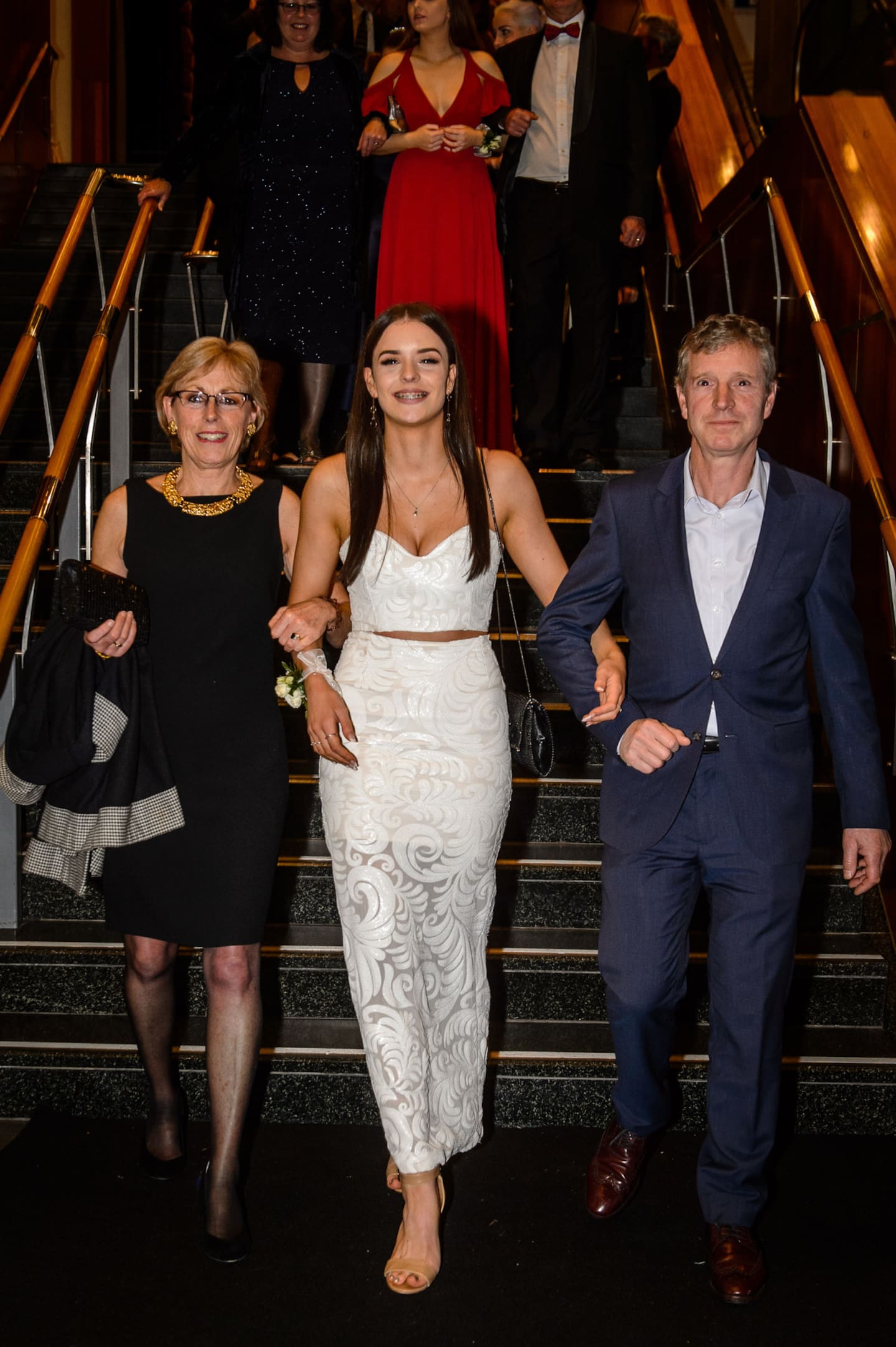
A former tenant at a Dunedin flat where a 19-year-old student died has wept while telling an inquest the decision to lock bedroom doors during the overcrowded party has plagued his mind “every day” since.
On October 6, 2019, Sophia Crestani and hundreds of others crammed into a 114-year-old villa on Dundas St, known as The Manor, where a party dubbed “The Manor presents Maggot-fest” was being held.
The party spiralled out of control as more than 300 people attended, prompting tenants to call the police; in the ensuing chaos, Sophia was fatally crushed on the staircase.
A five-day inquest into her death started on Monday morning in Dunedin District Court.
Sophia’s parents, Elspeth McMillan and Bede Crestani, have travelled from Wellington for the inquest and are representing themselves to cross-examine witnesses.

Sophia with her parents at the Queen Margaret College Year 13 Ball in Wellington in June 2017. Photo / Crestani family
A former Manor tenant, who has interim name suppression, gave evidence that he was one of eight students who sought to rent the two-storey flat.
The party was planned as a final “doozie” before the flat was sold to the university. About 250 people were invited on social media, though hundreds of others were notified by word of mouth, the inquest heard.
It was one of three large parties hosted at The Manor that year.
The tenants barricaded three rooms to limit the party areas, covered the floor in plastic and set up two DJ booths, one upstairs protected by farm gates and one downstairs by crowd control barriers.
During cross-examination, Crestani asked the witness about a previous party in July that received several noise complaints resulting in an email from their property manager that they would be referred to the Tenancy Tribunal, and the subsequent decision of the tenants to host another party.

The house at Dundas St in Dunedin where student Sophia Crestani died. Photo / Jason Oxenham
The witness said he felt there was an expectation, as a “named” flat, to have two or three big parties a year and the tenants felt opposition to the property manager.
“Retrospectively, it doesn’t seem like they were out to get us, but that was the way relationships of North Dunedin flats seemed to go with their owners.”
He said the tenants listed the party on the online register Good One, which they thought would have alerted local authorities to the party.
He said barricading some rooms was “retrospectively ... one of the worst decisions we’ve ever made”.
He told the inquest he was in his bedroom with two friends, with the door locked, during most of the party.
As the party progressed, there was banging on his door and yelling outside but he said this did not raise alarm bells as it had happened before.
Crestani asked: “What were you doing to look after the health and safety of your guests so they didn’t die?”
“Not much. Nothing,” said the witness.

Sophia Crestani and her mother Elspeth McMillan. Photo / Supplied
McMillan asked the witness if he thought opening his door would have allowed people to get to safety. He said: “Yes.”
The witness wept as he told the inquest he thought about that decision “every day”.
Rebekah Jordan, counsel assisting the coroner, asked if the tenants were prioritising personal property over the safety of partygoers.
“At the time we weren’t prioritising one over the other but, looking back, it can look that way,” he said.
Former Manor tenant recalls moment he found out Sophia had died
A tenant who was romantically involved with Sophia Crestani in the months before her death told the inquest about the night she died.
He met her through mutual friends. She had visited The Manor a handful of times before the party.
He had contacted her through social media earlier in the day and saw her occasionally throughout the party on October 6.
He last saw her some time after 9pm at the top of the stairs outside his bedroom. He “gave her a hug and a kiss” and told her they’d catch up later.
“She wasn’t absolutely written off, stumbling around or anything, she was completely with it.”
He had been in his bedroom for about 15 to 30 minutes “having a breather” with his mates when the music suddenly stopped.
About five minutes later, they saw lights from the multiple emergency response vehicles outside.
He told the inquest he went out of his window onto a balcony and filmed the scene on Snapchat.
When he re-entered the flat, a police officer on the stairs told him and others to leave.
Outside, a friend approached and hugged the witness but he did not know why. Shortly after, another friend hugged him and said: “I think it’s Sophia.”
He said he did not try to contact Crestani after the party, as he “didn’t want to believe” what had happened. About 3am, he was at a friend’s flat when another friend arrived and told him Crestani had died.
He told the inquest the tenants had taken safety steps after previous parties and he believed they were enough to make the October party safe.
It was the first year all of the tenants had been flatting and they were all learning to leave independently, he said.
Coroner Heather McKenzie began the inquest on Monday by addressing Sophia’s parents, saying their loss was “incalculable”.
“Sophia was a much-loved family member who was in Dunedin to study at the University of Otago ... She was just beginning her adult life when she died.”

Sophia Crestani. Photo / Supplied
She acknowledged Sophia’s parents’ desire to see changes in Dunedin’s student culture, and the creation of the Sophia Charter, a shared commitment by Dunedin stakeholders, including the university, police, Fire and Emergency New Zealand, Otago Property Investors Association, Dunedin City Council and Otago University Students’ Association to enhance the safety and wellbeing of the student community.
The task of the inquest was not to apportion liability but to consider what had happened in Dunedin since Sophia’s death and decide whether any recommendations should be made to help prevent similar deaths, she said.
“There has been a lot to absorb and deal with in preparation for the inquest and we are thankful that it is finally happening,” McMillan told the Herald ahead of the hearing.
“Hopefully it will provide us with answers to what, when, how and why, some accountability and some positive recommendations so that another senseless death or injuries can be avoided.”
The inquest continues.
Ben Tomsett is a Multimedia Journalist for the New Zealand Herald, based in Dunedin.
Take your Radio, Podcasts and Music with you









